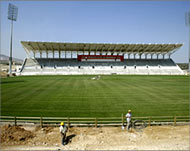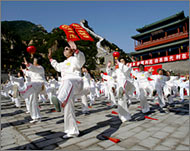Athens and Beijing: Games apart
Athens and Beijing. Olympic host cities do not get more different.

Whereas the Greek capital’s preparations for last year’s games went down to the line, Beijing is sailing along – and there’s still three years to go.
China was going so fast, in fact, that International Olympic Committee,IOC, officials had to convince it to slow down, warning that finishing venues too early could incur huge maintenance and financing costs.
“Olympic venue construction is advancing smoothly and construction of new venues will soon be in full swing,” Liu Qi, president of the Beijing Organising Committee for Olympic Games, BOCOG, assured in an address at this week’s IOC meeting in Singapore.
It’s hard to overstate the importance of the Beijing games to China. Winning hosting rights was a source of huge national pride and credited as a major achievement for the Communist Party that has been seeking to shore up its shaky legitimacy with appeals to nationalism.
That pride has translated into strong government support in the preparation stage, in contrast to the massive construction and organisational delays that followed after Greece won its bid.
Exhorbitant cost
Beijing expects to spend $2 billion on venues, but has earmarked a further $24.2 billion for new subway lines, roads and other infrastructure.
 |
|
Beijing expects to spend $2 billion |
With the IOC’s help, they’re hoping to get the most for their money.
The number of new stadia to construct has been cut to five, which will leave Beijing with 11 new venues, 11 existing ones and nine temporary structures to be dismantled after the games.
Work is well underway on the main stadium, nicknamed the “bird’s nest” for its latticework of girders stretching in every direction. Planners decided to drop its retractable roof and reduced seating from 100,000 to 91,000, saving 12,000 tons of steel.
The indoor stadium also has been roughly halved to 63,000 square metres following the scrapping of commercial space that had been planned above the basketball hall.
Greening
Meanwhile, green space around the city is being expanded and residents are being urged to learn English and other foreign languages.
Ground was also broken early this month on the 65-hectare (160-acre) Olympic Village, which will be home to 16,000 athletes and officials during the games.
 |
|
China is taking great pride in |
China “attaches great importance to the preparations for the Beijing Olympics, and also regards it as an integral part of the country’s economic and social development in the early years of the new century,” Liu said.
Beijing resolved a major issue on Friday with an agreement to hold the equestrian events in Hong Kong due to concerns over animal diseases in the Chinese capital.
But pollution and gridlock remain serious, despite what Liu called “remarkable achievements” in air quality control. Beijing is moving polluting industries and plans to relieve congestion by speeding up subway construction and setting up special traffic lanes and transit lines.
And then there are the farmers of Shunyi county.
Demanding compensation for their land, they’ve set up makeshift barriers around a 5000-hectare (12,300-acre) plot assigned for the Olympic Park that will host the rowing and canoeing events. Beijing organisers aren’t commenting and it’s unclear on how it will end.
Preparations differ
Along with efficiency, Athens and Beijing also strike a stark contrast in styles. Athens’s preparations were led by Gianna Angelopoulos-Daskalaki, a gregarious former Member of Parliament with an international background and strong rapport with IOC members and the media.
Liu, on the other hand, is a career Communist Party official, an engineer with long experience in the state iron and steel industry.
His background was born out in his presentation, filled with Communist Party stock phrases such as “implement the concept of scientific advancement and build up a harmonious society.”
He held no news conferences at Singapore and remained largely out of sight, despite more than 1300 media representatives assembling to cover the IOC vote for host of the 2012 Games. London won that decision over Paris, New York, Madrid and Moscow.
And while Greece, hardly a sporting power, was content with 16 medals when it hosted the Summer Games, including six golds, Beijing’s plans are to dominate.
China was second at Athens with 32 golds and 63 medals in total, behind the US with 35 golds and an overall tally of 103.
Seeking to ramp up that number, China recently inked an agreement with Russia for joint cooperation on training each other’s athletes in sports in which they excel.
China’s goal for Beijing is 110 medals.